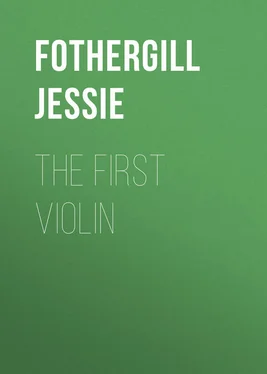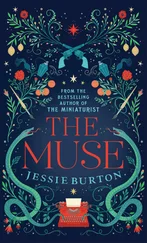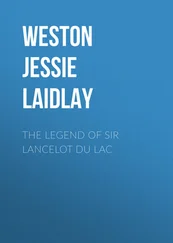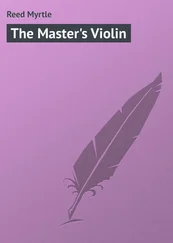Jessie Fothergill - The First Violin
Здесь есть возможность читать онлайн «Jessie Fothergill - The First Violin» — ознакомительный отрывок электронной книги совершенно бесплатно, а после прочтения отрывка купить полную версию. В некоторых случаях можно слушать аудио, скачать через торрент в формате fb2 и присутствует краткое содержание. Жанр: foreign_antique, foreign_prose, foreign_sf, на английском языке. Описание произведения, (предисловие) а так же отзывы посетителей доступны на портале библиотеки ЛибКат.
- Название:The First Violin
- Автор:
- Жанр:
- Год:неизвестен
- ISBN:нет данных
- Рейтинг книги:4 / 5. Голосов: 1
-
Избранное:Добавить в избранное
- Отзывы:
-
Ваша оценка:
- 80
- 1
- 2
- 3
- 4
- 5
The First Violin: краткое содержание, описание и аннотация
Предлагаем к чтению аннотацию, описание, краткое содержание или предисловие (зависит от того, что написал сам автор книги «The First Violin»). Если вы не нашли необходимую информацию о книге — напишите в комментариях, мы постараемся отыскать её.
The First Violin — читать онлайн ознакомительный отрывок
Ниже представлен текст книги, разбитый по страницам. Система сохранения места последней прочитанной страницы, позволяет с удобством читать онлайн бесплатно книгу «The First Violin», без необходимости каждый раз заново искать на чём Вы остановились. Поставьте закладку, и сможете в любой момент перейти на страницу, на которой закончили чтение.
Интервал:
Закладка:
“ Mein Fräulein , in what can I assist you?”
His English was excellent – his bow like nothing I had seen before. Convinced that I had met a genuine, thorough fine gentleman (in which I was right for once in my life), I began:
“I have lost my way,” and my voice trembled in spite of all my efforts to steady it. “In a crowd I lost my friends, and – I was going to Elberthal, and I turned the wrong way – and – ”
“Have come to destruction, nicht wahr ?” He looked at his watch, raised his eyebrows and shrugged his shoulders. “The Elberthal train is already away.”
“Gone!” I dropped my rugs and began a tremulous search for my pocket-handkerchief. “What shall I do?”
“There is another – let me see – in one hour – two — will ’ mal nachsehen. Will you come with me, Fräulein, and we will see about the trains.”
“If you would show me the platform,” said I. “Perhaps some of them may still be there. Oh, what will they think of me?”
“We must go to the wartesaal,” said he. “Then you can look out and see if you see any of them.”
I had no choice but to comply.
My benefactor picked up my two bundles, and, in spite of my expostulations, carried them with him. He took me through the door inscribed Ausgang , and the whole thing seemed so extremely simple now, that my astonishment as to how I could have lost myself increased every minute. He went before me to the waiting-room, put my bundles upon one of the sofas, and we went to the door. The platform was almost as empty as the one we had left.
I looked round, and though it was only what I had expected, yet my face fell when I saw how utterly and entirely my party had disappeared.
“You see them not?” he inquired.
“No – they are gone,” said I, turning away from the window and choking down a sob, not very effectually. Turning my damp and sorrowful eyes to my companion, I found that he was still smiling to himself as if quietly amused at the whole adventure.
“I will go and see at what time the trains go to Elberthal. Suppose you sit down – yes?”
Passively obeying, I sat down and turned my situation over in my mind, in which kind of agreeable mental legerdemain I was still occupied when he returned.
“It is now half past three, and there is a train to Elberthal at seven.”
“Seven!”
“Seven: a very pleasant time to travel, nicht wahr ? Then it is still quite light.”
“So long! Three hours and a half,” I murmured, dejectedly, and bit my lips and hung my head. Then I said, “I am sure I am much obliged to you. If I might ask you a favor?”
“ Bitte, mein Fräulein! ”
“If you could show me exactly where the train starts from, and – could I get a ticket now, do you think?”
“I’m afraid not, so long before,” he answered, twisting his mustache, as I could not help seeing, to hide a smile.
“Then,” said I, with stoic calmness, “I shall never get to Elberthal – never, for I don’t know a word of German, not one,” I sat more firmly down upon the sofa, and tried to contemplate the future with fortitude.
“I can tell you what to say,” said he, removing with great deliberation the bundles which divided us, and sitting down beside me. He leaned his chin upon his hand and looked at me, ever, as it seemed to me, with amusement tempered with kindness, and I felt like a very little girl indeed.
“You are exceedingly good,” I replied, “but it would be of no use. I am so frightened of those men in blue coats and big mustaches. I should not be able to say a word to any of them.”
“German is sometimes not unlike English.”
“It is like nothing to me, except a great mystery.”
“ Billet , is ‘ticket,’” said he persuasively.
“Oh, is it?” said I, with a gleam of hope. “Perhaps I could remember that. Billet ,” I repeated reflectively.
“Bil let ,” he amended; “not Bil lit.”
“Bill-yet – Bill- yet ,” I repeated.
“And ‘to Elberthal’ may be said in one word, ‘Elberthal.’ ‘ Ein Billet – Elberthal – erster Classe. ’”
“ Ein Bill-yet ,” I repeated, automatically, for my thoughts were dwelling more upon the charming quandary in which I found myself than upon his half-good-natured half-mocking instructions: “ Ein Bill-yet, firste – erste – it is of no use. I can’t say it. But” – here a brilliant idea struck me – “if you could write it out for me on a paper, and then I could give it to the man: he would surely know what it meant.”
“A very interesting idea, but a vivâ voce interview is so much better.”
“I wonder how long it takes to walk to Elberthal!” I suggested darkly.
“Oh, a mere trifle of a walk. You might do it in four or five hours, I dare say.”
I bit my lips, trying not to cry.
“Perhaps we might make some other arrangement,” he remarked. “I am going to Elberthal too.”
“You! Thank Heaven!” was my first remark. Then as a doubt came over me: “Then why – why – ”
Here I stuck fast, unable to ask why he had said so many tormenting things to me, pretended to teach me German phrases, and so on. The words would not come out. Meanwhile he, without apparently feeling it necessary to explain himself upon these points, went on:
“Yes. I have been at a probe” (not having the faintest idea as to what a probe might be, and not liking to ask, I held my peace and bowed assentingly). He went on, “And I was delayed a little. I had intended to go by the train you have lost, so if you are not afraid to trust yourself to my care we can travel together.”
“You – you are very kind.”
“Then you are not afraid?”
“I – oh, no! I should like it very much. I mean I am sure it would be very nice.”
Feeling that my social powers were as yet in a very undeveloped condition, I subsided into silence, as he went on:
“I hope your friends will not be very uneasy?”
“Oh, dear no!” I assured him, with a pious conviction that I was speaking the truth.
“We shall arrive at Elberthal about half past eight.”
I scarcely heard. I had plunged my hand into my pocket, and found – a hideous conviction crossed my mind – I had no money! I had until this moment totally forgotten having given my purse to Merrick to keep; and she, as pioneer of the party, naturally had all our tickets under her charge. My heart almost stopped beating. It was unheard of, horrible, this possibility of falling into the power of a total, utter stranger – a foreigner – a – Heaven only knew what! Engrossed with this painful and distressing problem, I sat silent, and with eyes gloomily cast down.
“One thing is certain,” he remarked. “We do not want to spend three hours and a half in the station. I want some dinner. A four hours’ probe is apt to make one a little hungry. Come, we will go and have something to eat.”
The idea had evidently come to him as a species of inspiration, and he openly rejoiced in it.
“I am not hungry,” said I; but I was, very. I knew it now that the idea “dinner” had made itself conspicuous in my consciousness.
“Perhaps you think not; but you are, all the same,” he said. “Come with me, Fräulein. You have put yourself into my hands; you must do what I tell you.”
I followed him mechanically out of the station and down the street, and I tried to realize that instead of being with Miss Hallam and Merrick, my natural and respectable protectors, safely and conventionally plodding the slow way in the slow continental train to the slow continental town, I was parading about the streets of Köln with a man of whose very existence I had half an hour ago been ignorant; I was dependent, too, upon him, and him alone, for my safe arrival at Elberthal. And I followed him unquestioningly, now and then telling myself, by way of feeble consolation, that he was a gentleman – he certainly was a gentleman – and wishing now and then, or trying to wish, with my usual proper feeling, that it had been some nice old lady with whom I had fallen in: it would have made the whole adventure blameless, and, comparatively speaking, agreeable.
Читать дальшеИнтервал:
Закладка:
Похожие книги на «The First Violin»
Представляем Вашему вниманию похожие книги на «The First Violin» списком для выбора. Мы отобрали схожую по названию и смыслу литературу в надежде предоставить читателям больше вариантов отыскать новые, интересные, ещё непрочитанные произведения.
Обсуждение, отзывы о книге «The First Violin» и просто собственные мнения читателей. Оставьте ваши комментарии, напишите, что Вы думаете о произведении, его смысле или главных героях. Укажите что конкретно понравилось, а что нет, и почему Вы так считаете.












